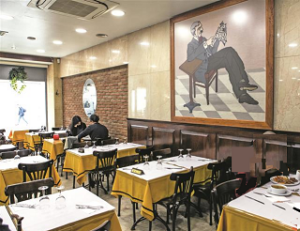
Eça de Queirós and the eating table
Being in Portugal in 2018, and the Uab (Universidade Aberta) being very close to Confeitaria Cister, where Eça de Queiroz attended, there is even a drawing of the song he liked to stay and write there (photo), I remember the Portuguese table remembering this corner of Lisbon, and Eça’s writings on the dining table.
very close to Confeitaria Cister, where Eça de Queiroz attended, there is even a drawing of the song he liked to stay and write there (photo), I remember the Portuguese table remembering this corner of Lisbon, and Eça’s writings on the dining table.
One of the most common texts on the subject is an article known as “Archaeological cuisine”, published in 1893, in Gazeta de Notícias, Lisbon, Portugal. In it Eça stated: “the table has always been one of the strongest, if not the strongest foundation of human societies” and also “the character of a race can be deduced simply from its method of roasting the meat” (III, p. 1226)
Eça anticipated the reflections of historians such as Jean François-Revel (1996) and Massimo Montanari (2004), for whom the values of the food system are the result of the representation of cultural processes and relationships develop according to economic, nutritional and symbolic criteria.
The author not only proposed observations of cuisine in classical societies, but also considered that gastronomy has an arché, a basic element of the representations of Portuguese society, which was noticed by several of its readers and critics, the food awoke, for example, Machado de Assis’s attention as early as 1878.
The Brazilian fashion, Machado de Assis saw there in Eça an unnecessary abundance, the argument about this type of excess is opposed to the gastronomic coherence that is constituted throughout the work, the food is related to the excess of this literary school, if Eça had not continued to be careful with this theme, care should increase both in quantity and in quality in the following works and versions, reinforcing for example that the author of “Os Maias” may have found in the kitchen the fundamental elements of his project of represent Portugal through its most characteristic features.
What is certain is that the table expands to cultural and social values, as well as literary schools, the times of development of societies and cultures reflect them.
ASSIS, Machado. Eça de Queirós: O Primo Basílio. In: Obra Completa. V. III. Rio de Janeiro: Aguillar, 1997.









